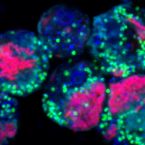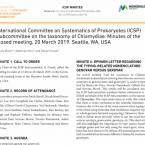Publications
Publications in peer reviewed journals
Symbiont-mediated defense against Legionella pneumophila in amoebae
2019 - mBio, 10: e00333-19
Abstract:
Legionella pneumophila is an important opportunistic pathogen for which environmental reservoirs are crucial for the infection of humans. In the environment, free-living amoebae represent key hosts providing nutrients and shelter for highly efficient intracellular proliferation of L. pneumophila, which eventually leads to lysis of the protist. However, the significance of other bacterial players for L. pneumophila ecology is poorly understood. In this study, we used a ubiquitous amoeba and bacterial endosymbiont to investigate the impact of this common association on L. pneumophilainfection. We demonstrate that L. pneumophila proliferation was severely suppressed in Acanthamoeba castellanii harboring the chlamydial symbiont Protochlamydia amoebophila. The amoebae survived the infection and were able to resume growth. Different environmental amoeba isolates containing the symbiont were equally well protected as different L. pneumophila isolates were diminished, suggesting ecological relevance of this symbiont-mediated defense. Furthermore, protection was not mediated by impaired L. pneumophila uptake. Instead, we observed reduced virulence of L. pneumophila released from symbiont-containing amoebae. Pronounced gene expression changes in the presence of the symbiont indicate that interference with the transition to the transmissive phase impedes the L. pneumophila infection. Finally, our data show that the defensive response of amoebae harboring P. amoebophila leaves the amoebae with superior fitness reminiscent of immunological memory. Given that mutualistic associations between bacteria and amoebae are widely distributed, P. amoebophila and potentially other amoeba endosymbionts could be key in shaping environmental survival, abundance, and virulence of this important pathogen, thereby affecting the frequency of human infection.




